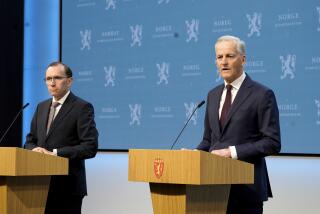Risking Greek Anger, 5 EC Nations Recognize Macedonia
- Share via
BELGRADE, Yugoslavia — Five European Community nations established diplomatic ties with the former Yugoslav republic of Macedonia on Thursday, freeing the tiny Balkan state from political limbo and risking the wrath of Greece.
The moves formally recognizing Macedonia two years after its vote for independence are expected to ease the flow of foreign loans and assistance to the struggling republic, which has been locked in a dispute with Athens over its right to use the same name as a northern Greek province.
But at a time of ominous signs that the Balkans war may be poised for another flare-up, the decisions by Germany, Britain, France, Denmark and the Netherlands to extend ties to Macedonia raised fears that the precariously situated republic could be drawn into the deadly conflict.
Macedonian President Kiro Gligorov welcomed the diplomatic overtures as “a contribution toward our integration in European associations.”
He also sought to allay Greek fears that his country covets union with Greek Macedonia, as Athens has repeatedly alleged in its attempts to thwart international acceptance of Macedonia until it changes its name.
“The Republic of Macedonia has no territorial pretensions toward any of its neighbors,” Gligorov asserted in a statement issued from the Macedonian capital, Skopje.
German Chancellor Helmut Kohl told reporters in Bonn that the time is right “to support the moderate Macedonian leaders,” alluding to concerns expressed by Gligorov that diplomatic isolation was undermining his country’s stability and encouraging nationalist radicals.
A statement from the Dutch government said it considered the establishment of relations with Macedonia to be “a contribution to the internal and external stability of the republic.”
Danish Foreign Minister Niels Helveg Petersen said he doubted there is “any risk of aggression by the new state against Greece.”
Western diplomats in this Yugoslav capital described the move as an effort to spare the Greek government further battles on the issue during its six-month term with the EC presidency, which begins in January.
But with the 12-nation community now openly split on the Macedonian question and Greece vowing to use its term in the rotating presidency to push for lifting sanctions against the Serbian-dominated Yugoslavia, frictions among EC members can be expected to heat up, warned one Belgrade-based envoy.
Some Greek officials have conceded defeat in the war of words over Macedonia, but others, including Prime Minister Andreas Papandreou, have hinted that Greece might retaliate by closing the border with Macedonia, which would sever the young state’s vital access to the Greek port of Salonika.
Macedonia earned membership in the United Nations a year ago under the temporary name of The Former Yugoslav Republic of Macedonia. It is included under the T’s in U.N. alphabetical listings and is the only member state prohibited from flying its flag at New York headquarters.
The EC traditionally makes unanimous decisions, but the 11-1 deadlock over Macedonia prompted the bloc to leave the issue up to each individual nation.
Greek government spokesman Evangelos Venizelos complained to reporters that the decisions of the five EC states, conveyed to Athens after last weekend’s EC summit in Brussels, represented a “violation of EC solidarity.”
The European battle over Macedonia comes amid other new strains in the Balkans, where Serbian rebellions against the proclaimed independence of former Yugoslav republics have exposed the Continent to its worst bloodletting since World War II.
Serbs who occupy one-third of Croatia held an election last weekend that appears to have chosen a hard-line nationalist as president of their self-styled Republic of Serbian Krajina.
In Bosnia-Herzegovina, fighting has worsened in many areas despite reports both here and in the Croatian capital of Zagreb that an agreement to partition the republic into three ethnic enclaves may be signed as soon as next week.
And an election in Serbia this weekend could add to the region’s political strains, as Serbian President Slobodan Milosevic battles against rival nationalists to stay at the helm of the drive to create a Greater Serbia.
Macedonia is considered the most volatile flash point in the Balkans because of its mixed population and unfortunate geography. It lies between Greece and the rump Yugoslavia, Balkan allies who fear their trade routes could be hampered by an east-west axis developing among Macedonia, Turkey, Bulgaria and Albania.
Of Macedonia’s 2 million citizens, as many as 40% are ethnic Albanians who could be enticed to cross into Serbia to defend brother Albanians in the province of Kosovo in the event that Serbian nationalist forces attack them.
Retaliation by Yugoslavia against Macedonia for any cross-border incidents could unleash the nightmare scenario of a regionwide escalation drawing in all neighboring countries and pitting NATO members Greece and Turkey against each other.
Balkan Flash Point
Because of its mixed population, location and Greek opposition to its name, Macedonia is considered the most volatile flash point in the Balkans.
Countries recognizing Macedonia:
1. Britain
2. France
3. Netherlands
4. Denmark
5. Germany
More to Read
Sign up for Essential California
The most important California stories and recommendations in your inbox every morning.
You may occasionally receive promotional content from the Los Angeles Times.














